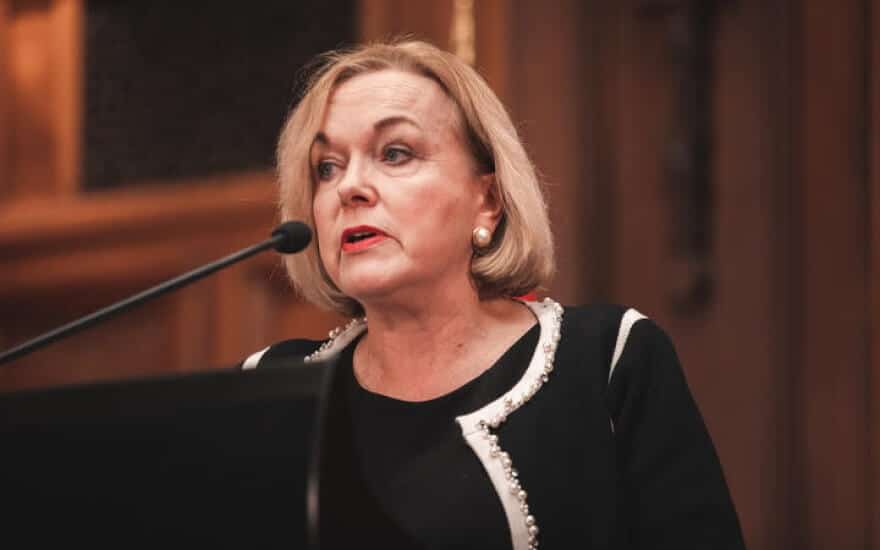National’s promising a short-term package of tax cuts – worth about $4.7 billion – to kick start the economy.
Leader Judith Collins and finance spokesperson Paul Goldsmith announced the policy in Wellington this morning.
Watch the announcement Here:
The changes would be made by significant increases to income tax thresholds, but would only be in place for 16 months, from December this year until March 2022.
National says this would put $46.50 each week in the pocket of the average earner.
Other key aspects of its economic plan are a revised debt repayment target, more generous tax write-offs for new business assets, and a tighter budget for new spending.
- Lift the bottom tax threshold from $14,000 to $20,000, the middle threshold from $48,000 to $64,000 and the top threshold from $70,000 to $90,000, from 1 December 2020 until 31 March 2022 – estimated cost $4.7bn
- Offering a 12-month tax incentive for investments over $150,000 for businesses that invest in new plant, equipment and machinery and double the depreciation rate for such businesses – estimated cost $430m
- Winter Energy Payment would not change
- The previously announced JobStart scheme, paying businesses $10,000 for every new job created
- The BusinessStart scheme, allowing
New Zealanders who lose their job to claim $10,000 tax credit and up to $20,000 from KiwiSaver for working capital for a new business
National says it would achieve that by a more disciplined approach including suspending Super Fund contributions, and scrapping spending on initiatives like tertiary fees free and KiwiBuild.
The party says it would trim back the amount of money available each year compared to Labour, allowing it pay debt more quickly. Under National the cap would be $1.8bn compared to $2.4bn as laid out by the government in the May Budget.
It would return New Zealand to surplus by 2028, the party says, and the package also leaves $10.2bn in unallocated operating allowances over the next four years.
It says it would achieve that by a more disciplined approach including suspending Super Fund contributions, and scrapping spending on initiatives like tertiary fees free and KiwiBuild.
The party pulled back on its original plan to have debt to 30 percent of Gross Domestic Product (GDP) within a decade, with a new target of 35 percent by 2034. That compares to 48 percent under Labour’s plan.
It also plans to invest $31bn on transport in the next 10 years, $1.1bn in education, $800m in health, $900m in social development and $170m in law and order, and set up an infrastructure bank to ensure well-managed investments and minimise debt.
The announcement follows the release of the Treasury’s analysis of the government books ahead of the election in the pre-election economic and fiscal update on Wednesday, and official GDP figures yesterday that showed New Zealand in its first recession since 2010 – and the deepest fall in living memory.
National’s finance spokesperson Paul Goldsmith says the pre-election update showed their original plan would not be “practical or feasible” given the economic forecasts.
Its plan would also require a “more disciplined approach” to spending, he says.
“Suspending Super Fund contributions, eliminating wasteful spending like Fees Free and KiwiBuild.”
That would not represent a cut to public service, insists Goldsmith.
“It’s not a cut, it’s not a cut to social spending or anything like that, there’s just more discipline to the extension of spending over the extended period of time.”
National says more than 2.6 million taxpayers would benefit from the tax cuts, including more than a million who would get more than $2500 over the 16 months.
The party also plans to set up a Border Protection Agency to help manage Covid-19.
Labour responds
In the lead-up to today’s announcement, Labour finance spokesperson Grant Robertson said National’s economic stance was in a “Bermuda triangle” of trying to achieve three incompatible things at once.
“They both want to increase spending, reduce revenue and dramatically reduce debt. You can’t do all of those things at once credibly and I think their plan is lost somewhere in that triangle.”
Robertson repeated this criticism this morning, targeting National’s leadership spills this year and the likelihood of a coalition with ACT.
“National is a shambles, with multiple leaders, incoherent policy this year and growing factions,” Robertson said in a statement. “Now their health spokesman is talking about his leadership ambitions.”
He said National would be forced to implement severe cuts – including to incomes of the elderly in winter as a price of working with ACT, which could exploit internal divisions to demand radical changes as the price of government.
“On current polling, if National are to have any hope of forming a Government, ACT will have to play a big role.
“ACT’s radical austerity plan puts popular programmes like KiwiSaver, Superannuation, the Winter Energy Payment and Working for Families at risk, right at a time when people need certainty and continuity.”
Source: rnz.co.nz, Republished by arrangement

